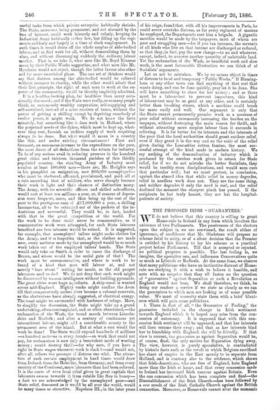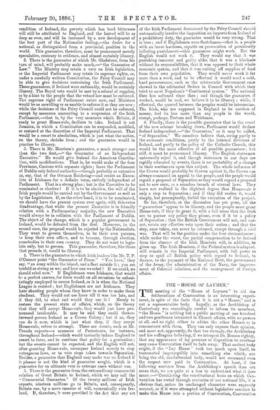THE PROPOSED IRISH "GUARANTEES."
WE do not believe that this country is willing to grant Home-rule to Ireland in any form which involves the existence of two Parliaments. The passiveness of the electors upon the subject is, we are convinced, the result either of ignorance, of confidence that Mr. Gladstone will propose no scheme fatal to unity, or of a silent decision that the Premier is entitled by his history to lay his scheme as a practical project before Parliament. Till that is accepted or rejected, no political progress is possible. The last feeling is, we imagine, the operative one, and influences Conservatives quite as much as Liberals or Radicals. At the same time, we observe that many politicians who have an instinctive distrust of Home. rule are studying it with a wish to believe it feasible, and note with no surprise that they all fasten on the question of " guarantees " against Separation or such a Revolution as England would not bear. We shall therefore; we think, be doing our readers a service if we state as clearly as we can the guarantees to which men are looking as of some possible value. We must of necessity state them with a brief• blunt- ness which will pain some politicians.
1. There is, first of all, "the Guarantee of Feeling," the guarantee included in the change in Irish sentiment towards England which it is hoped may arise from the con-
cession of autonomy. It is supposed that with this con- cession Irish sentimext will be appeased, and that her interests will then resume their sway ; and that as her interests bind her to friendship with England, she will be friendly. If that view is correct, the guarantee as against Separation would be, of course, final, the only motive for Separation dying away. The view, however, is purely speculative, is contradicted by historic facts such as the revolt in which Belgium sacrificed her share of empire in the East merely to be separate from Holland, and is contrary also to the evidence, whioh shows that Irish-Americans, who are free of England, hate England more than the Irish at home, and that every concession made to Ireland has increased Irish rancour against Britain. Even the one concession which has been complete and final—the Disestablishment of the Irish Church—has been followed by a new revolt of the Irish Catholic Church against the British connection. Moreover, as Home-rule cannot alter the economic
condition of Ireland, the poverty which has bred bitterness will still be attributed to England, and the hatred will be as deep as ever, and will be increased by a. new development of the best part of the Nationalist feeling,—the desire for a national, as distinguished from a provincial, position in the world. This guarantee, therefore, must be pronounced merely speculative, contrary to evidence, and almost certainly illusory.
2. There is the guarantee of which Mr. Gladstone, from his turn of mind, will probably make much,—" the Guarantee of Law." The Ministry may retain a veto on Irish legislation, or the Imperial Parliament may retain its supreme rights, or, under a carefully written Constitution, the Privy Council may be able to give decisions restraining the Irish Parliament. These guarantees, if Ireland were unfriendly, would be certainly illusory. The Royal veto would be met by a refusal of supplies, or by a hint to the people that the vetoed law must be enforced. The supreme right of Parliament exists now, and Ministers would be as unwilling or as unable to enforce it as they are now ; while the decisions of the Privy Council could not be enforced, except by measures amounting to a suspension of the Irish Parliament, —that is, by the very measures which Britain, if ready to grant Home-rule, declines to take. Ireland is not Jamaica, in which a Constitution can be suspended, modified, or restored at the discretion of the Imperial Parliament. That would be a resort to absolutism, which is just what the nation, on the theory, shrinks from ; and the guarantee would in practice be illusory.
3. There is Mr. Harrison's guarantee, a much stronger one than the two first,—" the Guarantee of an Independent Executive." He would give Ireland the American Constitu- tion, with modifications. That is, he would make of the four Provinces, Cantons with separate rights ; leave the Parliament of Dublin only federal authority—though probably as extensive as, say, that of the German Reichstag—and create an Execu- tive of Irishmen for a definite term, entirely independent of Parliament. That is a strong plan ; but is the Executive to be nominated or elective ? If it is to be elective, the will of the Irish people would be carried out by the Government as well as by the Legislature. If, on the other hand, it is to be nominated, we should have the present system over again, with this extra disadvantage, that while the present Executive is in friendly relation with a Parliamentary majority, the new Executive would always be in collision with the Parliament of Dublin. The object of the change, which is a popular government in Ireland, would be defeated from the first. Moreover, in the second case, the proposal would be rejected by the Nationalists. They want to govern themselves, to be their own patrons, to keep their own officas, and to become, through election, somebodies in their own country. They do not want to legis- late only, but to govern. This.guarantee, therefore, like those that precede it, would be illusory.
4. There is the guarantee to which Irish leaders like Mr. T. P. O'Connor point "the Guarantee of Force." "You have," they say, "an army within the island, and a fleet outside it ; you are tenfold as strong as we; and how can we rebel ? if we could, we should rebel now." If Englishmen were Irishmen, that would la3 a perfect answer, for force would on all occasions be unhesi- tatingly employed to coerce Ireland, as it is when the National League is resisted ; but Englishmen are not Irishmen. They hate shooting people whom they know in order to make them obedient. They would not use force till it was too late, and if they did, to what end would they use it ? Merely to restore the present state of affairs, which, on tin theory that they will accept Home-rule, they would just have pro- nounced intolerable. It may be said they could thence- forward govern Ireland as a Crown Colony ; but if so, they can do it now, which is just what they, if they accept Home-rule, refuse to attempt. There are events, such as Mr. Fronde expects—a massacre of Protestants, for instance, throughout Ireland—which would instantly induce England to resort to force, and to continue that policy for a generation ; but the events cannot be expected, and the English will not, after granting Home-rule, reconquer Ireland merely to stop outrageous laws, or to veto steps taken towards Separation. Besides, a guarantee that England may make war on Ireland if it pleases is not the kind of guarantee sought, which is a guarantee for an ultimate veto in extreme cases without war.
5. There is the guarantee from the extraordinary commercial relation of Great Britain to Ireland, which we may call the "Commercial Guarantee." Of the twenty millions of Irish experts, nineteen millions go to Britain, and, consequently, Britain ean; by a mere exercise of will, economically ruin Ire- land. If, therefore, it were -provided in the Act that any ant of the Irish Parliament denounced by the Privy Council should automatically involve the imposition on imports from Ireland of a prohibitory duty, the guarantee would be very strong. That is true ; and if Englishmen were Scotehmen—that is, a people with an inner hardness, capable on provocation of persistently inflicting punishment—this guarantee might work. But the English would not work it. They Would say that it was punishing innocent and guilty alike, that it was a blockade without its responsibilities, that it was opposed to their whole economic system, and that it was cutting off supplies of food from their own population. They would never work it for more than a week, and to be effectual it would need a cold, hard perseverance, such as the aristocratic Government once showed in the celebrated Orders in Council with which they tried to meet Napoleon's "Continental system." The nationa,1 fibre has softened since then ; and though the guarantee, if worked, would be real, we believe it to be illusory ; while, if effectual, the quarrel between the peoples would be internecine. The Dish, who are supposed in England to be careless of money, feel its loss more than any people in the world, except, perhaps, Bretons and Welshmen.
6. Finally, there is the possible guarantee that in the event of the new scheme breaking down, Parliament would declare Ireland independent,—" the Guarantee," as it may be called, "of Separation." We ourselves believe that, owing partly to the economic conditions, partly to the internal divisions of Ireland, and partly to the policy of the Catholic Church, this would be the most effective of all possible guarantees ; but still, it must be pronounced illusory. The English statesmen universally reject it, and though statesmen in our days are rapidly educated by events, there is no probability of a change in their sentiments upon this subject. The whole influence of the Crown would probably be thrown against it, the Crown can always command an appeal to the people, and the people would regard a proposal of Separation as they would regard a proposal not to sow corn, as a senseless breach of eternal laws. They have not realised in the slightest degree that Home-rule is only a step to Separation ; and if they did realise it, would simply, but peremptorily, forbid the execution of the project.
So far, therefore, as the discussion has yet gone, all the "guarantees "appear to be illusory, and the people must grant Home-rule, if they do grant it, with a full sense that the Irish are to pursue any policy they please, even if it be a policy of Separation ; that the British Government will not, _and can- not, retain any effective veto upon their action ; and that the step, once taken, can never be retraced, except through a civil war. That will be the position under the best circumstances ; while under the worst, the partial compensation to be derived from the absence of the Irish Members will, in addition, be given up. The Irish Members, if the Federal system is adopted, will remain in the Imperial Parliament, with full power to stop or spoil all British policy with regard to Ireland, to. finance, to the payment of the National Debt, the government of the Army, the administration of the Navy, the improve- ment of Colonial relations, and the management of foreign affairs.



































 Previous page
Previous page